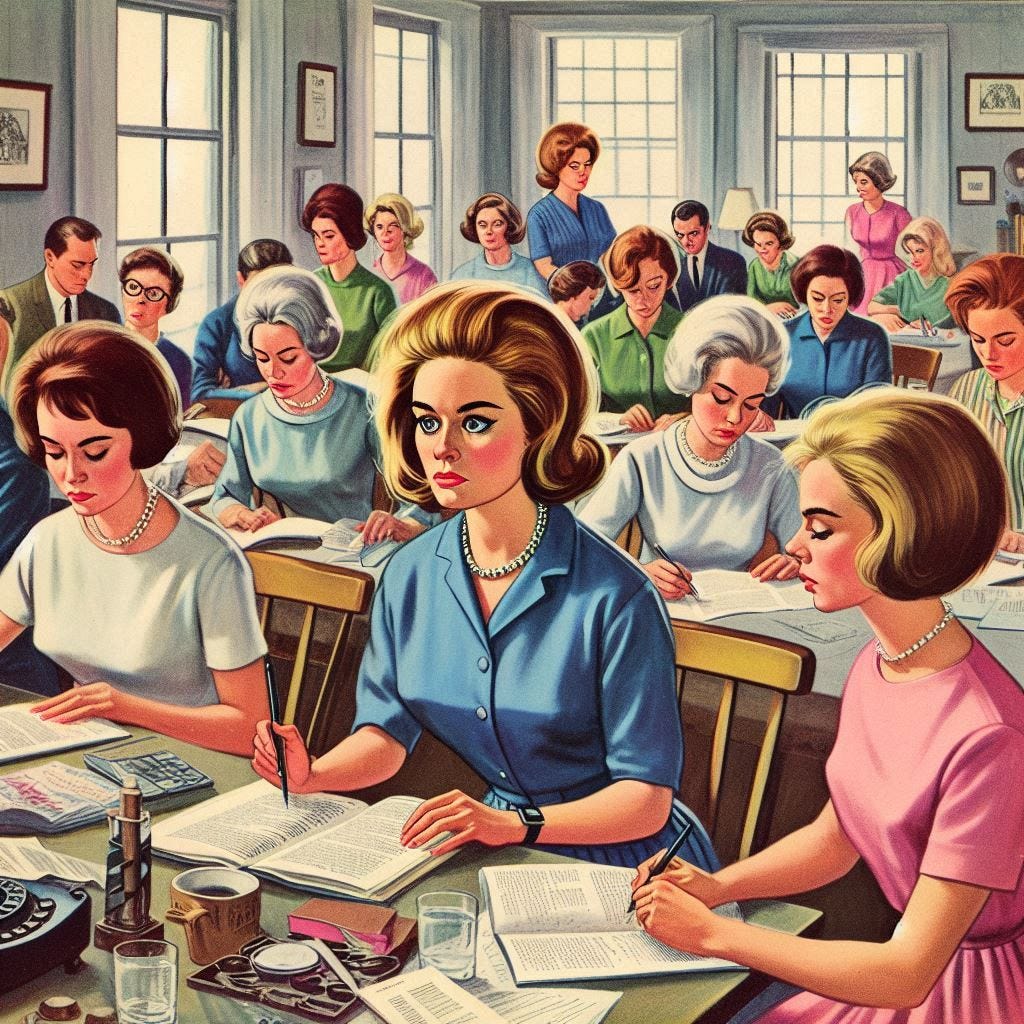The Mysteries of History (February 19 Edition)
Benedict Arnold, Donner Party, Phonograph, Japanese Internment, Iwo Jima, and The Feminine Mystique
“Those who cannot remember the past are condemned to repeat it.” — Spanish-American philosopher George Santayana, 1905
1777 — Arnold Pouts Over Being Passed Over for Promotion
public domain image from wikimedia commons
On this date in 1777, during the Revolutionary War, Benedict Arnold received upsetting news: younger officers had received promotions, and he had not. A former Patriot hero of the battles of Ticonderoga and Saratoga, Arnold, born in Connecticut Colony in 1741, now decided to switch loyalties, becoming a Loyalist (“Patriots” were against Britain, “Loyalists” were for Britain). He expressed his pique by offering the strategically located fort at West Point to the British. Although Arnold’s treachery was foiled and the fort remained in Patriot hands, he continued fighting with the British until the end of the war, and then absquatulated to England, where he died in London in 1801 at the ago of 60.
Questions: When you hear the name “Benedict Arnold,” what is the first word or string of words that immediately come to mind? Why was Arnold linked with Jefferson Davis in an 1865 political cartoon? Why did the younger officers receive promotions ahead of Arnold? Do you think the reason was valid? Should the deciders have promoted Arnold in addition to that bunch, or instead of one of them? Was Arnold fighting on the side of his native country to achieve personal glory, or because the was a true believer in the cause of American independence?
1847 — Donner Party Rescue Begins
public domain image
The year before gold was discovered in California, and two years before the massive influx of ‘49ers, people were already streaming west, to Oregon and California in particular. The group of westward-Ho travelers who became known as The Donner Party decided to avoid the usual, tried-and-true route and take a new route from Wyoming to California that was enticingly called the Hastings Cutoff. Taking it was a mistake. They got snowed in near Truckee Lake (now called Donner Lake) in the Sierra Nevada mountains, which made crossing the pass impossible.
On this day in 1847, after enduring cold and privation in the snow, the first group of rescuers (who had been told of the party’s predicament by some who had made their way out on snowshoes) arrived. Of the 89 who started out from Springfield, Illinois in the Spring of 1846, only 45 (just over half) survived the trip.
What follows is an excerpt from the chapter 1846: Rebels and Cannibals (Very Steep Marching Indeed) of my book Still Casting Shadows: A Shared Mosaic of U.S. History, Volume 1: 1620-1913
Among the would-be emigrants to California were the members of the Donner Party. Their first mistake was choosing George Donner as their leader. That mistake led to another, more directly disastrous, decision: their taking of a supposed shortcut recommended in a guidebook written by a man who had never actually been on the trail he described in his book.
This series of faulty decisions culminated in the party being surprised by an early winter storm, trapping them in the Sierra Nevada Mountains. Sadly, some of them eventually assuaged their hunger by cannibalizing other members of the party after these had died of starvation, exposure, or sickness.
Questions: How much of the blame for the Donner Party’s debacle rightly rests with George Donner? How much with Hastings? How did life turn out for the survivors of the catastrophe? Which of the survivors lived the longest in age? Which of the survivors lived the longest as far as the year of their death goes? How many people were involved in the rescue efforts, and did any of them die while engaged in this mission of mercy?
1878 — Edison Helps Bring Music to the Masses
public domain images from wikimedia commons
Serial inventor (he of the 1,093 patents) Thomas Edison engineered a way to record and play back sound. On this date in 1878 he received one of his patents, this time for the phonograph. Standing on Edison’s giant shoulders, telephone maven Alexander Graham Bell improved on the process. As a result, people can now listen to music recorded by musicians and singers from across time and space. Prior to this, the only music people heard was live — they either played it themselves, usually at home on a piano or guitar, or heard others play at a relative’s or neighbor’s house, otherwise at a concert in the park, or at church.
As a side note to this, the first professional American songwriter, Stephen Foster (1826-1864), died before the opportunity to record his music was a possibility for him. Many others, though, have recorded “covers” of his songs (such as Oh! Susanna, Beautiful Dreamer, My Old Kentucky Home, Old Folks at Home (Swanee River), Camptown Races, Jeannie with the Light Brown Hair, Hard Times Come Again No More, Ah! May the Red Rose Live Alway, Slumber My Darling, and others).
On a personal note, my maternal great-grandmother, Virginia Belle (Myers) Green was born in 1879 (in Grant City, Missouri). This ties in with the Stephen Foster song “Virginia Belle” perhaps, as her parents may have been familiar with that 1860 song, and named her for it.
Questions: Why was “IT PLAYS CORNET SONGS” a selling point for the phonograph? What is a Cornet? Do you have any vinyl albums? CDs? Cassettes? 8-Track tapes?
1942 — FDR Sends Japanese-Americans to Concentration Camps
public domain images from wikimedia commons
The controversial internment of Japanese-Americans during World War 2 began on this day in 1942, when U.S. President Franklin D. Roosevelt signed an order calling for “enemy aliens” to be sequestered away from vaguely defined “military areas” in the western part of the U.S in euphemistically termed “Relocation Centers. ” These were basically concentration camps, although life in them was not nearly as difficult or dangerous as it was for those held in German camps throughout Europe.
This internment came two-and-a-half months after the bombing of Pearl Harbor by the Japanese military on the infamous day of December 7, 1941. Some Italian-Americans and German-Americans were also affected by the order, but the Japanese-Americans were those who suffered the brunt of the blow. Even those Japanese who had full U.S. citizenship and those whose families had been in the U.S. for generations were rounded up and relegated to the life of detainees (if they happened to reside in the “wrong places,” that is). Just one of the camps, Manzanar in California, had over 120,000 “evacuees,” as they were sometimes referred to, which is approximately the same number of people who now reside in Concord, California.
FDR’s wife Eleanor attempted to dissuade him from the forced relocation of Japanese people, but he refused to hear her out or let her speak of it again.
Questions: Were there valid reasons to intern people because of their ethnicity? Would letting all Japanese people live their lives “free” as they had before been worth the risk? What was the Supreme Court’s take on the matter? Gerald Ford’s, later? Ronald Reagan’s, still later? Were reparations ever offered to those interned and if so, what did the reparations consist of? How many who experienced life in the internment camps are still living?
1945 — Marines Invade Iwo Jima
public domain image from wikimedia commons
Eighty years ago today, near the end of World War 2, U.S. Marines invaded the island of Iwo Jima. The government considered it prime real estate because of its strategic location: being only 660 miles from Japan, they could use it as an airfield from which to drop bombs on their Japanese enemies. The Americans had been “softening up” the Japanese soldiers who were there defending the island for months, bombing them continuously.
When the Marines arrived in person (rather than simply airmailing their “get out” messages), it came at a steep cost. On the first day alone, 550 Marines lost their lives and 1,800 others were wounded. The battle lasted another 35 days, and when it was over and the Americans had hoisted their flag there (a photo of which that has been seen by just about everyone won the Pulitzer Prize), a total of 6,800 U.S. Marines had been killed, and another 20,000 injured. Japanese forces had lost 18,000 men, with another 216 being taken captive.
Questions: Who took the famous photograph of the flag being raised on Iwo Jima? Who were the soldiers who raised it? Is there a story behind it? How long did it take before Iwo Jima was being used as an airfield to attack Japan? Did the enormously costly (in lives lost) taking of Iwo Jima make a significant difference in the outcome of the war? Was it worth nearly 25,000 people dying, and untold others being severely harmed physically and emotionally? Had the “frogmen” who were shot at by Japanese soldiers, thus giving away the position of their “hidden” gun emplacements, been “set up?” In other words, had they been knowingly sacrificed by their “superior” officers in order for them to gain this “intelligence?” If so, did the frogmen know that this was the case when they received their orders?
1963 — Betty Friedan’s “The Feminine Mystique” Published
public domain image from wikimedia commons
Betty Friedan (February 4, 1921 to February 4, 2006) had a degree in psychology and had been active in “radical” politics throughout her life. Her 1963 book “The Feminine Mystique” was considered “over-the-top” even by many people at her publishing house. Freidan’s argument was that American women, in general, were not really as docile and content with their lot in life and role in society as they might appear to be.
Friedan’s book examined ways in which women were treated and viewed as second-class citizens, although oftentimes nominally “put on a pedestal.” Women’s magazines and advertisements were used as evidence for this suppression and denigration of women.
Friedan and The Feminine Mystique had many critics, including some of the female “persuasion,” but her influence has persisted. She co-founded NOW (the National Organization for Women) and pushed for equal pay for “the fairer sex” (in 1963, the year her book was published).
Questions: Have you read “The Feminine Mystique”? Have your views on feminism changed over the years? If so, why? If not, why not? What is/was your parents’ views on feminism? How about your peers/friends? What are your thoughts on “Girl Power”?















